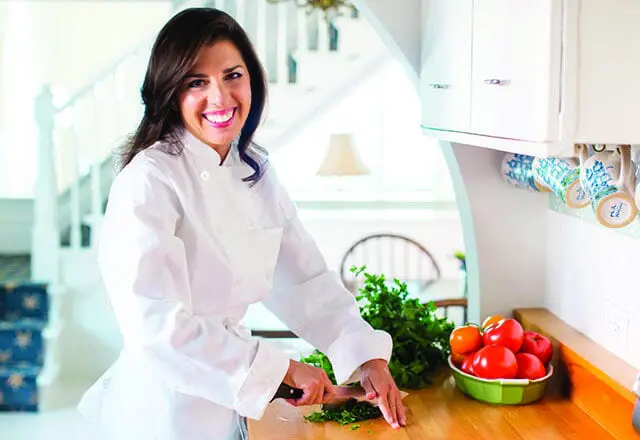
Cooking is a skill manifested in the chef’s experience and the food’s cultural identity— a mix of art, anthropology and personal connections received through the taste buds. In her book “Rose Water & Orange Blossoms”, Lebanese American author Maureen Abood delivers a balance of first-person stories, traditional recipes with a modern touch and mouthwatering images.
“I have always loved cooking Lebanese food,” Abood told The Arab American News.
After graduating with a master’s in literature from Michigan State University, Abood moved to Chicago where she worked for a nonprofit and freelanced for food publications. But her passion has always been making food and writing about it.
“I really wanted to go to cooking school and thought that’s something I will do someday,” she said. “At a certain point I decided that was the time. I had turned 40. I had a close family member who passed away. She was 41. I thought if this could happen I need to think about what I really want to do and take the risk to do it.”
Abood then went to culinary school in San Francisco for a year.
“It was a total pleasure and during that time I was thinking about this book,” she said. “Talking with editors and people I had networked with in the food publishing world, everybody said ‘you must start blogging before you propose this book.’ And I did it.”
As her blog grew in popularity and received positive reviews from food critics, Abood’s goal of turning it into a book started becoming a reality.
“The book was a natural next step,” she said.
Abood said the style of cooking Lebanese cuisine— the focus on fresh herbs, fruits and vegetable, ample vegan options, use of spices and broad range of dishes— makes it appealing and special.
The author said she views her book and food in general as a cultural bridge.
“Everyone must eat and most people love to eat,” she said. “We are drawn to eating communally, to come together with family and friends, making sure food is an integral part of our interactions with others. This does become a bridge to inviting anyone who might not know very much about Lebanese culture to see it through the food, through family, through a personal lens that the book offers with the stories.”
Some recipes in the book are followed by autobiographical anecdotes that highlight the author’s personal bond to the food.

Abood said her connection to Lebanese cuisine, which is displayed in the stories, has always been an important part of her writing and cooking.
“You cannot separate that emotion from eating and cooking and being with family,” she said. “My blog from the beginning was dedicated to exceptional stories. That is really personal.”
She added that sharing stories from her own life has helped make the book a window into her culture, “so that we can relate to one another and people can come in and say, ‘we’re not so different.'”
Following her recipe for mujadara, a Lebanese delicacy made of lentils, cracked wheat (burghul) and rice, topped with caramelized onions, Abood tells how she came to appreciate the classic dish, despite avoiding it as a child.
“Lentils didn’t hold a lot of kid-appeal among my siblings,” she wrote.
But during her grad school years, she gave up meat for a short time and her mother gave her a vegetarian cookbook. She rediscovered mujadara, but in a favorable light this time. As a child, she wrote, she stayed away from lentils just like someone walking far away from a dog at the park out of fear that it might bite. She wrote that her mother’s reaction to her swearing off meat charmed her “into walking right up to lentils, as if they were a feared dog, only to discover how wonderful they could be.”
Abood’s vivid descriptions paint mental images of tasty dishes that can motivate the readers to bring the recipes to life in the kitchen.
Here’s how she introduces fattoush salad, which habitual consumers take for granted as a simple dish: “This classic is a favorite for its crunchy pita chips, tart sumac and crisp vegetables with romaine dressed in a perfect balance of tanginess and sweetness, owing to vinaigrette of pomegranate molasses and lemon juice.”
The book starts with Abood’s visit to and bond with Lebanon and what it embodies to her in terms of hospitality, food and family stories. She then highlights her relationship with her sitto (grandmother), whose resilience inspired Abood.
“This Sitto-strength, in a phrase, is what I aspire to every day.”
In additional to her book and blog, Abood has started an online shop (maureenaboodmarket.com), selling fresh ingredients for her recipes.
“This is an exciting adventure for me because so many of my readers, from around the country and around the world, ask me where to find the ingredients,” Abood told The Arab American News. “I want everybody who makes this food and takes the time to cook to be using the best ingredients, so they can experience the best of what they’re making.”






Leave a Reply